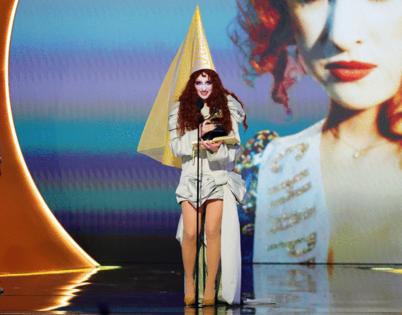Commentary: Chappell Roan made discomfort in motherhood seem like a bad thing
Published in Lifestyles
“All of my friends who have kids are in hell.”
When Chappell Roan said these words on a recent episode of the "Call Her Daddy" podcast, she probably didn’t foresee the online firestorm they would create. The 27-year-old pop star went on to say that she doesn’t know anyone her age with children who is “happy, well-rested, or has light in their eyes.”
While Chappell seemed to be talking about parenthood in general, it was mostly mothers who either immediately rushed in to defend her or clapped back with sunny videos of themselves and their children and comments like: “Having children is a blessing, not a burden.”
As a psychologist, I see something missing from both the contempt for motherhood and the rush to defend it. When people talked about having and raising children, whether as a blissed-out nirvana or a nightmare to be avoided, the through line that united them was the assumption that discomfort is a bad thing. But what if it’s not?
You’d be forgiven for thinking that it is, though, especially considering how childrearing is too often depicted in media. The reactions to Chappell reminded me of how I’ve generally found a simplistic divide in most articles, books, movies and TV shows about motherhood: either it is a sun-dappled heaven of cute babies, baking bread and helpful husbands (see the “tradwife” trend online), or a frightening parody of dirty diapers, sleepless nights and frazzled nerves (see many sitcoms).
In the first example, the takeaway is that motherhood “doesn’t have to be hard if you have certain things in place,” while the latter scenario teaches that being a mom is so unpleasant that you shouldn’t desire it.
To be fair, the public seems to accept that motherhood will come with physical unpleasantness: flabbier bellies, sore breasts and lack of sleep, to name a few. But the accompanying emotional unsteadiness? That’s largely a taboo subject. A 2019 study found that “new mothers may not admit that they are having problems adjusting to the maternal role because becoming a mother is socially perceived as a happy event. …They may feel guilty about having negative thoughts.”
Yet few things that are meaningful and really enlarge our lives come without pain. Think professional challenges, marriage or friendship. Why wouldn’t we expect motherhood to be on that list?
I recently read "Hidden Potential," a wonderful book by Adam Grant, an organizational psychologist, bestselling author and Wharton professor who studies the science of motivation. Grant is certainly not an expert on motherhood, and the book, published in 2023, doesn’t mention motherhood even once. But it has a lot to teach us about how we might reframe it. Grant outlined evidence that the people who are the most successful in life aren’t typically the most talented or driven but those who not only tolerate pain and discomfort — they assimilate it. “It’s not enough to simply accept minimal discomfort when it arises,” Grant writes. “Surprisingly, we’re better off actively seeking out discomfort. … The best way to accelerate growth is to embrace, seek, and amplify discomfort.”
Perhaps rather than denying the reality that motherhood can be challenging, we should view the difficult aspects of the experience as opportunities for personal growth. This is in no way to say that motherhood is the only means to expand one’s life; there are many ways to evolve without having children. And people should have the right to decide if they want parenthood to be part of their development.
But since childrearing is a topic that people — those who have kids and those who don’t — talk about, we can all do our part in shifting the narrative around motherhood, starting with what the expectations are. If we tell ourselves that motherhood should be an easy, seamless transition, we will feel shame, confusion and anger when it turns out not to be. Many of my patients, even the experienced moms, often ask, “What am I doing wrong?” or “I love my baby, but is it really supposed to be this hard?”
Questions like these come from attaching an ideal of perfection to a job that is far from perfect. Instead, when we talk about motherhood, we may want to lean into what Grant calls being “imperfectionists” and see discomfort as a catalyst. That way, when mothering (inevitably) becomes emotionally draining and a strain on our identity, our default is to talk about it — rather than pretend the negative feelings don’t exist or aren’t so bad.
There are some who may think it’s a no-brainer to have this mindset. But it can be a challenge to switch it on in moments when you need the perspective the most. I don’t know any mother who, when honest with herself, doesn’t feel heartbreak and frustration when her love is reciprocated with surliness, indifference and contempt. Hours of bending small plastic bodies into infuriatingly tiny outfits or researching how to get slime out of carpets are enough to drive even the most patient mom into a simmering fury.
Parenting my own kids, I’ve sometimes had to face parts of myself I didn’t want to see. Mix in the fact that we live at a time when our social feeds are filled with mom influencers and their seemingly well-put-together homes, kids and lives, and the idea of celebrating imperfections can seem counterintuitive.
For that reason, we need to stop pretending that mothering is not supposed to be depleting. If we could embrace its discomfort, we might feel some relief.
____
This column does not necessarily reflect the opinion of the editorial board or Bloomberg LP and its owners.
Sarah Gundle, PsyD is a psychologist in private practice and an assistant clinical professor at the Icahn School of Medicine, Mount Sinai Medical Center.
©2025 Bloomberg L.P. Visit bloomberg.com/opinion. Distributed by Tribune Content Agency, LLC.
























Comments